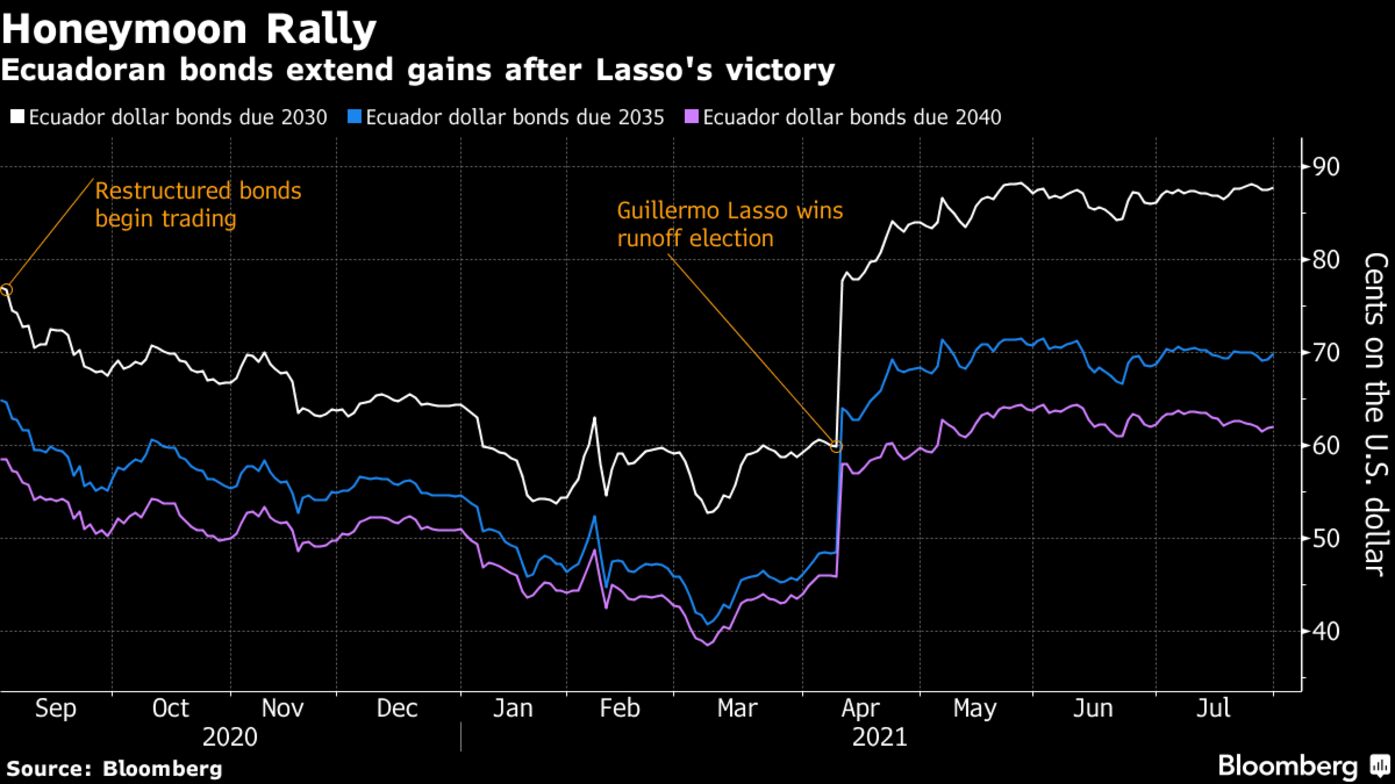Markets
Ecuador Defaulted Last Year. Now Its Bonds Are World’s Best
By and- Sovereign notes have returned 28% this year, most in the world
- ‘Ecuador is becoming a bit of an island in the region’
Across the world, government bondholders have seen losses pile up this year as a pickup in inflation and economic growth puts central banks under pressure to raise interest rates.
That makes even more remarkable the windfalls seen in Ecuador, a junk-rated South American nation that was mired in recession even before the pandemic and was forced to restructure $17.4 billion of debt last year -- a step rating companies considered a default.
Guillermo Lasso leaves the National Assembly after being inaugurated in Quito on May 24.
Photographer: Johis Alarcon/Bloomberg
The returns on the nation’s bonds have topped 28% this year, more than any other country, according to a Bloomberg Barclays index. It’s the result of a confluence of factors: a steady vaccination campaign, rising oil prices and optimism that the April election victory of President Guillermo Lasso, a former banker, will usher in a wave of market-friendly reforms.
The gains stand in contrast to the experience of investors in other major Latin American countries that have seen political unrest or the rise of left-wing parties amid the economic toll of the pandemic. Neighboring Colombia this year was rocked by bloody protests over the president’s ill-fated tax hike plans. In Chile, a former student protest leader to the far left of the nation’s political spectrum is ahead in the presidential race. And Peru’s markets have been whipsawed as President Pedro Castillo, a former rural schoolteacher from a Marxist party, called for a new constitution and a briefly delayed the appointment of his finance minister. On Friday, Moody’s Investors Service downgraded El Salvador.
“Ecuador is becoming a bit of an island in the region,” said Gorky Urquieta, a money manager at Neuberger Berman, whose firm holds about $30 billion in emerging-market debt.
Lasso defeated the left-wing protege of former President Rafael Correa, a self-declared socialist and ally of Venezuela who defaulted on $3.2 billion of debt in 2008. Lasso’s victory set off a rally that drove Ecuador bonds due in 2030 up 35 cents on the dollar to 87 cents. They may gain more after the interest rate reset to 5% from 0.5% at the end of July.
Top of the World
Ecuadoran debt has returned more than any other nation's this year
Bloomberg
During the runoff campaign, the 65-year-old dropped his stodgy image, sparking a craze for red sneakers as he connected with young voters. He pledged to vaccinate 9 million residents in his first 100 days.
On Saturday, a little over two months into his tenure, Lasso announced nine million had received at least one shot of the vaccine. The speed of the rollout has put the nation of some 17 million people on track to inoculate three-quarters of its population in about eight weeks, mirroring the path of the European Union, according to Bloomberg’s vaccine tracker.
“It’s essential that we Ecuadorians are vaccinated, and now starts a vision of job creation and economic reactivation,” said Juan Carlos Holguin, an entrepreneur who is helping with Lasso’s vaccine rollout.
The president has started initiating economic reforms, slashing customs duties and import restrictions and ordering changes to the oil industry in a bid to attract more private investment.
“Ecuador has had its share of economic instability over the years,” said Dan Shaykevich, the co-head of emerging-market and sovereign bonds at Vanguard Group Inc. “But this is also a country where you have a robust democracy and a change of leadership that’s very much trying to conduct policy that will be sustainable in the long term.”
Residents wait in line to receive a Covid-19 vaccine dose at a vaccination site in Quito on July 31.
Photographer: Johis Alarcon/Bloomberg
Lasso still faces considerable challenges. The economy contracted by nearly 8% last year, a record, and the International Monetary Fund projects it will only grow by 2.5% in 2021, less than half the pace expected for the region.
Lasso’s power to stimulate the economy is also limited because Ecuador uses the U.S. dollar as its currency, so it can’t rely on monetary policy to counteract downturns. Tax and labor reforms that Lasso promised during the campaign will likely face obstacles in the National Assembly, where two-thirds of the lawmakers are affiliated with left-of-center parties skeptical of market-friendly changes.
Lasso is also reliant on multilateral lenders, led by the IMF, to continue providing external funding as he works to rally private investment. The IMF extended $4 billion of emergency funding last year and Finance Minister Simon Cueva is seeking to strike a revised agreement with the fund by August.
Cueva, a former IMF representative in Bolivia, wants to soften some of the terms imposed by the lender to avoid a repeat of the austerity protests that rocked Ecuador in late 2019 and Colombia this year.
Fitch Ratings and S&P Global Ratings deem the nation six notches below investment grade, while Moody’s has a Caa3 rating on Ecuador, nine levels into junk. Cueva wants to create the fundamentals for the nation to eventually win investment-grade status.
Ashmore Group, one of the biggest owners of Ecuador’s debt, is holding on to its bonds, encouraged by Lasso’s pledges to shore up the economy.
“We still find it attractive but it’s not cheap anymore,” said Gustavo Medeiros, deputy head of research at Ashmore. “It’s hard to be short or underweight in a bond with such high yields in a country that’s doing the right thing.”




Keine Kommentare:
Kommentar veröffentlichen